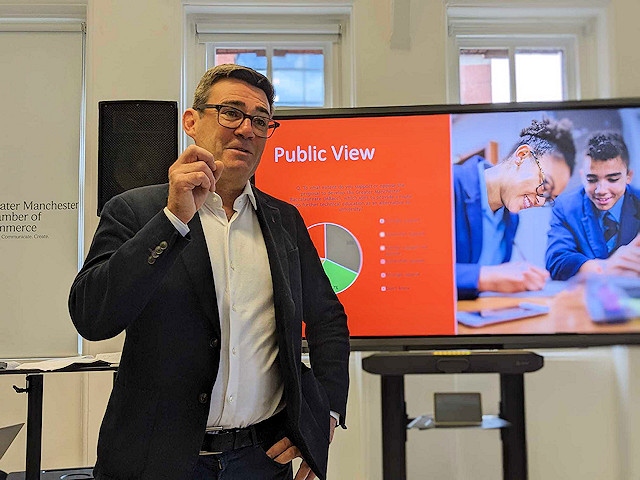[ad_1]
Date published: 28 September 2023

Photo: LDRS
Greater Manchester mayor Andy Burnham
Sixty businesses have backed Andy Burnham’s plans for technical education which the government has branded ‘narrow’ and ‘unequal’. Microsoft, Heinz and the BBC are among the big employers to sign up to the mayor’s scheme.
Mr Burnham wants businesses to work with schools, colleges and universities so that young people have ‘clear sight’ of career opportunities in sectors such as technology, construction and manufacturing. The Labour mayor hopes that creating the Manchester Baccalaureate will offer an alternative route into these sectors for the two-thirds of young people who do not go to university.
The MBacc would consist of a set of GCSEs which would lead to further study through BTECs, T-Levels and degree apprenticeships within the seven sectors. It promises to maximise the chances of getting a good job in those sectors while boosting the workforce in the local economy with home-grown talent.
The first schools to sign up to the scheme are set to offer the MBacc to some of their students from September 2024 and Mr Burnham hopes that the system will be in place across the city-region by the end of the decade. It comes after the government agreed to set up a new joint education board with Greater Manchester as part of the ‘trailblazer’ devolution deal earlier this year.
But months after signing the new deal, the Department for Education (DfE) described the MBacc proposal as ‘unequal’ and said that it would ‘narrow the opportunities available to young people’. Education secretary Gillian Keegan said the Greater Manchester mayor does not have the power to introduce the reforms by himself and that she is opposed to regional variations in education.
Mr Burnham believes the MBacc could be a template that is used across the country, but has argued that it would have to cater to the local economy of each area. He told the Local Democracy Reporting Service today (September 26), that the MBacc would ‘definitely not’ narrow young people’s opportunities.
He said: “This isn’t about closing things down at 14. It’s simply about giving people informed choices.
“At the moment the kids who are not on the university route don’t have that clarity. They don’t know what employers want them to take.
“That’s what we’re fixing. I don’t think it does anything other than open people’s horizons rather than narrow things down.”
Mr Burnham said that he wants engineering, computer science and creative subjects such as music, art and drama to be options within the MBacc. But he wants businesses to decide what is needed in this ’employer-driven’ system.
Businesses which have backed the MBacc so far include Siemens, Deloitte, Barclays, Autotrader, Seddon Construction and the Warehouse Project. One business from each of the seven sectors which the MBacc is focuseed on will be appointed to an Employers Integration Board to develop the plans further.
The board will help create more industrial placements so that young people develop the skills needed in the local economy and co-design the curriculum with technical education providers. For firms such as Microsoft, an initiative like this is important not only for their own business, but their supply chain too.
Marie Hamilton, who is the Greater Manchester region lead for the global technology giant, said digital skills are in demand in the local economy. She said: “From a Microsoft point of view, the Greater Manchester tech sector at the moment is thriving and actually to continue with that we need to bring people through the skill system.
“We need to show young people what the opportunities are and show them pathways to our digital sector. I think the ambition for a technical education system is really important because at the moment our young people don’t understand the opportunities that are available to them so we need to show them what those opportunities are but then actually, we need to be able to show them the pathways that they can follow to get there.
“I think by having two diverse routes, you have the opportunity then for those who wouldn’t have the ability to go to university for various reasons to find their way into the tech sector in a better way which would increase diversity, social mobility and it would help us to reach people from more of the region.”
According to Mr Burnham, a survey of 90 businesses found that 90 pc supported the MBacc, while 60 pc of the public also back the proposal. The Labour mayor has now urged his own party to adopt the policy nationally, calling for the opposition to learn from mistakes it made while in government.
He will also be lobbying the Conservative Party to support the scheme at its national conference in Manchester next week. Despite government criticism of the plans, Mr Burnham said, if he is re-elected next as Greater Manchester mayor next May, he would dedicate his third term to making them a reality.
He added: “I think this is going to be the most exciting policy development in England this decade. We’re using London’s plan for transport, but no one’s got a plan for this. We’re going to do it.”
In June, the DfE said that it would be up to individual schools to decide if they want to adopt this new approach.
A DfE spokesperson said: “Our reforms to post-16 qualifications are simplifying the system, providing a clearer choice of all the high-quality options available to young people including new T levels alongside A Levels, and creating a level playing field.
“The EBacc provides a sound basis for a variety of careers and opportunities post-16, however schools have autonomy to implement a curriculum that is best suited to their pupils. Whether to adopt a curriculum similar to the Mayor’s MBacc proposal would be a decision for individual schools or academy trusts to make.”
Joseph Timan, Local Democracy Reporting Service
[ad_2]
Source link
